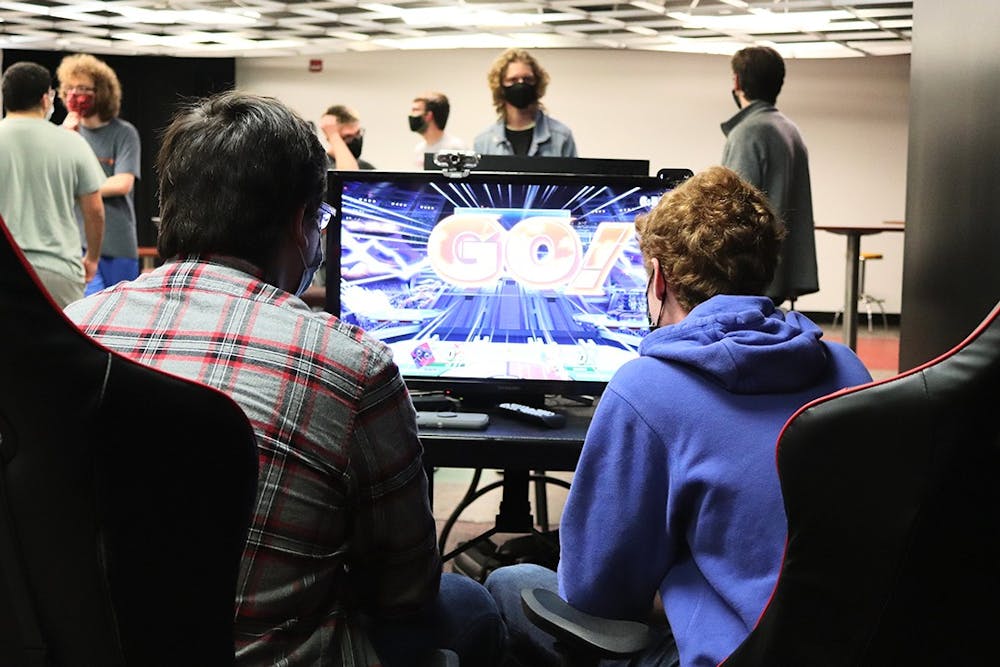On Thursday nights in the Russell Underground, pairs of intensely concentrated gamers can be found at television sets jabbing controllers, vying to win a game of Super Smash Bros. When one of the players wins, the makeshift audience of fellow players stands to give a little cheer.
Each week, the USC Smash Club, a section of the Gamecock Esports Club, come together just like this to give members an opportunity to get together and play, while bringing competition and community to gamers on campus.
Super Smash Bros. is a popular Nintendo video game series that features iconic and well-known characters from dozens of video games. Esports aside, it is a common part of the gaming community and houses some of the biggest competitions in the world for esports.
The Smash Club was established in 2016 as a component of the Gamecock Esports Club, which serves as a buzzing hub for gamers on campus to talk online and meet to play their game of choice. The Smash group interacts on Discord "everyday" leaving the chat riddled with gaming lingo and humor, but the group discusses topics like news and life advice too.
"It's just a great community. I have a lot of really good friends here, we became friends through the Smash Club. I wouldn't have know anybody if I just didn't show up to the first meeting my freshman year," said Alex Lofton, a third-year pre-med and music performance student, who helps set up the equipment for the weekly tournaments.
Every week, participating club members play in a casual tournament. Groups of a dozen or more meet up to play each other in a double-elimination bracket, with some games streamed on the livestream website Twitch and commentated by other players in the audience.
The skill level of the players varies: Some gamers are knocked out of the tournament in 20 minutes, while it can take over two hours for others.
“It’s cool, I feel like it’s just enough competition where it’s like I’m not outclassed but I’m also not outclassing anyone," Braeden Reed, a second-year political science student and ranked Smash player in South Carolina, said. "I feel like I’m on the same level as people, which is nice.”
Reed plays in official Smash tournaments, and placed well enough in them to be ranked the No. 6 and No. 9 best Smash player in the state at separate times.
The game is nostalgic for a many beyond these college gamers. Super Smash Bros. Brawl was released on the Wii in 2008, and many current players cite that game specifically as a motivating factor to play competitively now.
“It’s also pretty common as a party game, which makes it pretty easy for a lot of people to kind of casually get into, and then if they get hooked on the competitive scene, like there’s enough passion there from members of the community and places they can find, almost all over the world, to do tournaments with — a lot of people get in that way,” USC Smash Club team captain and tournament organizer Thomas Taylor, a fourth-year mathematics and economics student, said.
Taylor is tasked with managing the group and sets up the events for Smash gamers to play together in person, including tournaments with other schools.
The club has received some success in competitive tournaments it has travelled to in the past, placing fourth in a national Super Smash tournament in 2017.
Since then, Taylor said the group remained a “really good team," but the league that hosted official tournaments went bankrupt in the last year due to impacts from COVID-19. Taylor took this opportunity to organize informal tournaments with nearby colleges, with the group even winning against Clemson in a tournament in September.
“The community surrounding the game is even more passionate because of that grass-roots nature (of the Smash players). Almost everything is organized and run by the community itself," Taylor said.
The team captain is planning a large tournament for early next year with schools across the Southeast region, citing the eagerness of the team to play more games as a motivating factor.
Though the casual tournaments have an air of competitiveness, the main focus of the group is still on the game. Playing with a variety of characters, learning how to fight strategically and squaring off against challenging opponents and gaining experience and improving remain at the heart of the club and its members.
"I never really had that kind of (bad) experience, feeling rejected (and) not part of the community here at USC. Was welcomed immediately," said Lofton. "People are so vocal, so animated. It's a really great club, it's really awesome."

